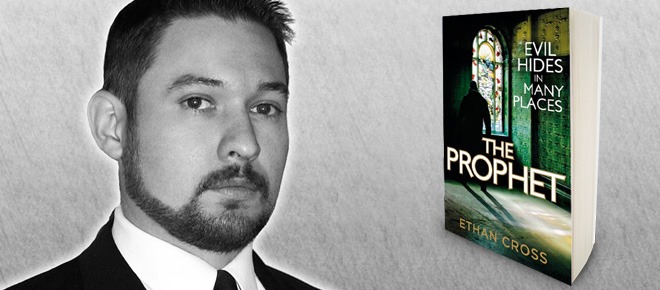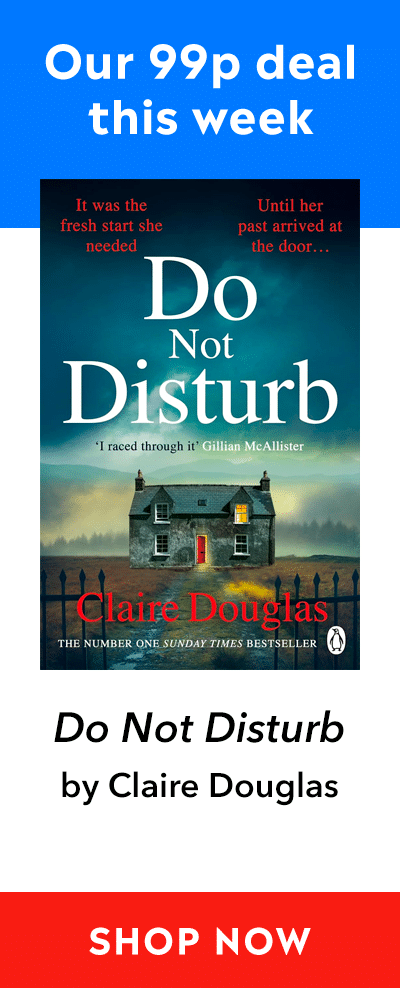Features
‘In the dock’ with Ethan Cross
Our featured author ‘in the dock’ this month is Ethan Cross.
Ethan Cross lives and writes in Illinois and is one of the sharpest emerging thriller fiction writers around. His latest book, The Prophet, has been described as ‘the best book of its kind since Thomas Harris retired Hannibal Lecter’.
We managed to prise Ethan away from his writing, his family and his two Shitzu’s to put him ‘In the Dock’ to answer our exclusive questions…
Ethan, please tell us about your new book in your own words?
With The Prophet, I wanted to explore the world of doomsday cults and the abuse of power wielded by the charismatic leaders of such groups but also on how the sins of parents affect their children. Throw in some gun fights and explosions, and you have a story! In the end, I just try to write books that I would want to read, and I believe that The Prophet would be greatly enjoyed by the fans of authors such as James Patterson, Lee Child, Dean Koontz, David Morrell, Thomas Harris and Jeffery Deaver.
Does your writing ever scare you?
No, it’s a lot of fun to get into the head of a killer and imagine the world through a different set of eyes, but it’s like an actor playing a role. I don’t become a killer or let dark thoughts consume me. I think that we all have a darker side (myself apparently more than others), and I just tap into that part of my brain. But that’s the cool (and therapeutic) thing about writing… I get to be all of the characters, good and bad, hero and villain.
In fact, I’d go as far as to say that my sense of compassion for both the killers and victims has grown since writing this type of book. A lot of situations within The Shepherd stem from imagining the scariest possible scenarios for me on a personal level, from both an internal and external viewpoint. It’s not what I’d like to do to someone else; it’s what I would never want to happen to me. And I think that’s why it resonates.
Are you a disciplined writer?
I am, and I’m not. During the outlining and development stage, I try not to force things too much and let the ideas come naturally. But once those ideas are down on paper in the outline (and I’m a very detailed outliner), I work off of a daily word count that’s based upon approximately how long I expect the book to be and when the deadline is. I try to stick to that number, but I also try not to limit myself if I’m on a roll or chastise myself too harshly if a certain section needs extra attention.
Who is your most recognised character and what or who was the inspiration behind that character?
The character most often commented upon by readers is definitely Francis Ackerman.
I think the key to writing any character well is first for the author to care deeply about that person, otherwise the audience never will. As strange as it sounds, I love Ackerman. He’s a complex character that has endured more pain than anyone could withstand and yet a part of him wants to be more than what he is. He wants to be a “good guy,” but his warped perception of the world and his appetite for pain makes this impossible.
The idea for Ackerman came about while researching serial killers and the concepts of nature versus nurture. I thought from a scientific standpoint of what the results would be if you studied the effects of pain and trauma experienced by children and measured the results. This, of course, could never be done because who in their right mind would willingly subject any child to such horrors. But what if the person wasn’t in their right mind? What if a broken psychologist decided to conduct such research on his own child? And that’s how Ackerman was born. He’s an amalgam of all the pain experienced by the world’s worst killers. He’s the child of monsters.
Where do you write your books?
Anywhere I can but most often I write on a laptop while sitting in a brown reclining chair in my office. I typically start by just thinking of everything I want to happen in the book (character moments, action sequences, etc). Then I begin to fit those pieces together. I have a dry-erase board and a cork board in my office as well. I brainstorm on the dry-erase and then begin lining up note cards on the cork board. These cards contain just enough info to let me know the linear progression of the book and how the pieces fit together. Then I craft an outline.
I’m an obsessive outliner. For The Prophet, I wrote a 170 page outline that went through two major drafts with feedback from my editors. This outline contains pretty much everything that’s going to happen in the book, even thoughts, research, and snippets of dialogue.
But for me, that’s the hard part. Once that’s done and the “writing” begins, things flow, and I’m able to focus on the intricacies. After the outline was done, I wrote the 125,000 words of the book in about a month and a half.
Which crime fiction related book, TV programme or film has had the most impact on you or your writing?
I would have to say that 24 has probably had the greatest impact on me. Not because of the subject matter or the type of story, but because of the intensity always presented in the show. I try to write books that I would want to read, and I like stories that are fast-paced with a lot of action. That’s what 24 was. It was a thrill-ride filled with twists and turns. My books are obviously very different from 24 but I hope that they have that same kind of intensity.
What is your favourite scene or line from any crime fiction book?
The one that sticks out in my head is a scene from a Lee Child book (I believe it was in Running Blind). In the scene, Jack Reacher is confronted by a couple of guys in an alleyway and the reader is introduced to Reacher’s thought processes and methods in detail as he considers how to dispatch the two enemies. It’s nothing very fancy or remarkable but it sticks out because it sets the tone of the series and the character so well.
Which non-fictional killer frightens you the most?
Off the top of my head, I would say Ted Bundy. The reason is that he was such a chameleon. He was the type of guy that you could know for years and consider a friend, yet beneath it all, he was a vicious killer. He’s the stereotypical monster next door.
What tip would you give any budding writers?
The first step in succeeding as a writer is having a deep love of stories and then learning how to write. You can do that in many ways including reading (and doing it a lot), taking classes, attending conferences, etc.
For me, the most significant and worthwhile experience was attending Thrillerfest in New York. While there, I took classes from some of the biggest selling and most accomplished writers in the world. I learned so much and have applied those techniques to my writing. I also made a lot of great friends and business connections while there.
So I guess I could sum it up as: have an incredibly strong desire to write and a deep love of stories, learn to write well (and keep learning and improving), and get out there and make connections.
E-book or paper?
At one time, I had an entire thirty foot wall lined with bookshelves stacked from floor to ceiling with books. When the Kindle first came out, I saw an opportunity to reclaim some of that space and only kept a portion of my collection. That also means that I was one of the unlucky few who payed close to $500 for my first Kindle. But I haven’t looked back. I prefer ebooks for their ease of use, portability, and the various highlighting and note-taking options.
If you were a fictional character, how would you write your own death?
Hmmm… Maybe death row execution by either firing squad or electric chair. Or perhaps I would have myself thrown out of an airplane. Whatever the case, it would have to be epic and exhilarating. No quiet death in bed for me.
…and what would your final meal be?
This is a fun one! Two cans of vanilla cake icing and a big bowl of vanilla ice cream with chunks of raw cookie dough and marshmallow cream.


1 Comment
Please note: Moderation is enabled and may delay your comment being posted. There is no need to resubmit your comment. By posting a comment you are agreeing to the website Terms of Use.